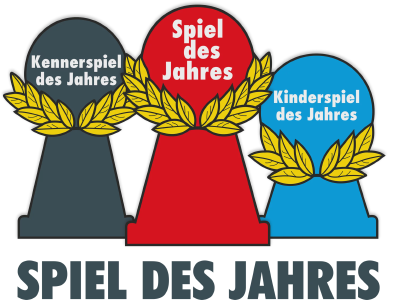
The waiting is finally coming to an end! On Saturday, July 16, the jury will announce the winners of Spiel des Jahres and Kennerspiel des Jahres 2022. We’re blessed with another year of very strong games and I’m certainly very excited to learn what games will win the two awards.
I’m proud to say that I’ve called both awards correctly for two years running, so there is a bit of pressure to keep up the streak. 😅 So without further ado, let’s look at the nominees.
Nominated for Spiel des Jahres 2022

Before we dive into the individual games, let’s look at some numbers to see some objective measures for them – as far as this is possible. What we’ve got at our disposal are the recommendations to the S_d_J bot, BoardGameGeek’s average rating and the Bayesian rating. Additionally, I’ve created a poll on BGG where the geeks could have their say:
| Game | R.G | Average | Bayes | Poll |
|---|---|---|---|---|
| Cascadia | 8.1 | 8.0 | 7.6 | 77.8% |
| SCOUT | 6.9 | 7.7 | 6.5 | 13.6% |
| Top Ten | 7.2 | 7.6 | 6.2 | 8.6% |
No doubt, the numbers are in favour of Cascadia. But will the jury agree? Let’s look at the nominees in a little more detail.
Cascadia
1–4 players, 30–45 minutes, 10+ years, medium light (1.9)
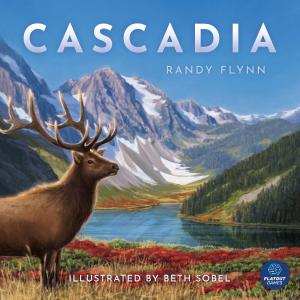
As mentioned, Cascadia was high on everybody’s list from the beginning. This tile-laying game of creating landscapes filled with animals certainly hit a nerve with the geek community: it’s currently ranked #68 overall on BGG and #1 in abstract games.
Despite these high praises and the strong numbers, I feel like there are a lot of caveats here. First, our Kennerspiel score was a little undecided as to what award it should be nominted in, so that speaks for a Spiel on the heavier side. Not a negative per se, but the jury did favour very light games over the past years for the family award. Also that classification as an abstract game isn’t particularly favourable: it exposes the fact that the setting is nothing but an excuse to draw cute animals on the tiles.
None of this matters if the gameplay was an overwhelming experience. But when reading through the jury’s reviews, the tone isn’t exactly enthusiastic. While everybody seems to have a good time, Cascadia doesn’t leave a lasting impression.
When you think of Spiel des Jahres as an ambassador for the hobby board gaming, I don’t think Cascadia is the best game for this job. Overall, it might be a fun, clever puzzle, but it also has a slightly dry and geeky aura to it that might fail to pull in new players.
SCOUT
2–5 players, 15 minutes, 9+ years, light (1.4)
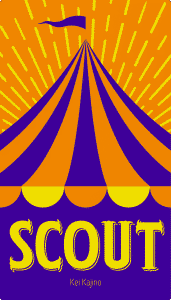
As soon as the nomination for SCOUT was announced, the jokes started to come in where on the tiny box the publisher would even put the red meeple. There certainly was a time when a small box card game would have been considered without chances of winning Spiel des Jahres, but Hanabi proved that this certainly isn’t the case anymore.
Card games do have some advantages: they’re cheap, portable and don’t intimidate anyone. But all accounts, SCOUT also has some very clever mechanisms going for itself.
Still, I would consider this to be the dark horse in this year’s race, though it would be a great service to the hobby if the jury showcased this gem from Japan to the Western markets.
Top Ten
4–9 players, 30 minutes, 14+ years, light (1.1)
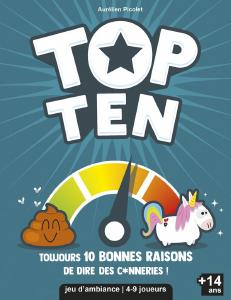
Top Ten was the nominee that filled the “not another party game” square in the annual Spiel des Jahres bullshit bingo. I got the impression most geeks saw this as another variation of Wavelength and glanced over it. But when reading through the reviews, they’re full of testimonies of joy and laughter. What better motivation to get people to the table?
Of course, there are always caveats. Maybe most importantly, a game like this requires the group to come together and bring the game alive with their creativity. That’s not to everyone’s liking, but the fact that the people around the table matter more than the mechanics is still a plus in my book.
The other, more formal, concern is that this would be the first Spiel des Jahres that doesn’t (claim to) work for three players. I’ve stipulated years ago that a Spiel des Jahres must work for three and four players, full stop. But the jury stated that MicroMacro doesn’t work for four players, and claiming games like Codenames and Just One can be played with three players is just a lie publishers habitually print on boxes. This didn’t stop the jury then and it shouldn’t stop them now.
Who will win?
I guess you don’t need to read between the lines above, my favourite for Spiel des Jahres 2022 is Top Ten. It just fits best in line with past winners: approachable, quick, fun – the best games of the three to bring all kinds of people together around the table. By all means, Cascadia and SCOUT seem strong games that definitely have their fans, but my feeling tells me that Top Ten is the kind of game the jury is after.
Nominated for Kennerspiel des Jahres 2022

Let’s take a look at the same metrics as above, but for the Kennerspiel nominees:
| Game | R.G | Average | Bayes | Poll |
|---|---|---|---|---|
| Cryptid | 8.6 | 7.5 | 7.2 | 25.0% |
| Dune: Imperium | 6.9 | 8.3 | 8.0 | 52.5% |
| Living Forest | 7.3 | 7.4 | 6.3 | 22.5% |
The recommendation algorithm picks Cryptid as its favourite, whilst the geeks choose Dune: Imperium. Or maybe Living Forest will surprise everyone in the end? Let’s take a look at the candidates!
Cryptid
3–5 players, 30–50 minutes, 10+ years, medium light (2.2)
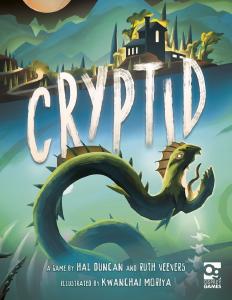
This still is an interesting nomination to me. Logical deduction games haven’t received much attention by the jury in the past, so it’s quite nice they highlight this genre as well. It’s still a tough sale for the general audience: essentially, you’re trying to solve a very cerebral puzzle, and there’s plenty of people who don’t particularly enjoy that kind of pastime.
But even within the genre, I have some reservations about Cryptid: I’ve played it twice, and both times someone at the table understood their clue wrong, which meant the game just completely fell apart. It feels in a way “irresponsible” to “unleash” this game to a wide audience that often will play fast and loose with the rules.
Finally, in the very same genre we’ve also had The Search for Planet X released in Germany recently which I consider to be the stronger game.
Don’t get me wrong, I actually quite like deduction games and Cryptid in particular. Lots of people do – there’s a lot of positive ratings of this relatively old game, so the strong performance for the recommendation algorithm is partially explained by that.
Dune: Imperium
1–4 players, 60–120 minutes, 14+ years, medium (3.0)
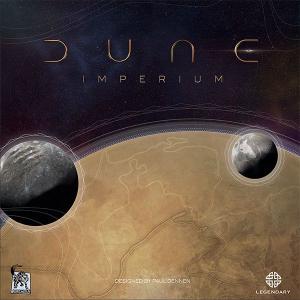
There have been much discussions beforehand if the jury would nominate a franchise game. They obviously did, and to paraphrase the jury’s chairman Harald Schrapers, they simply don’t care about these things, only if the game is fun. Many people will agree that Dune: Imperium is – it’s currently ranked as the 15th best game of all times on BGG.
Does this make it the favourite to win Kennerspiel des Jahres 2022? Not necessarily. For starters, it is pretty complex for an award that’s meant to take gamers one (and only one!) step further than the typical Spiel. There’s also some consideration if this combination of deck building and worker placement is too similar to last year’s nominee Lost Ruins of Arnak. I don’t think the jury cares - they might’ve, if Arnak had actually won.
In the end what we have is a fairly complex game with lots of high praises that might be just out of reach for the main award.
Living Forest
1–4 players, 40 minutes, 10+ years, medium light (2.2)
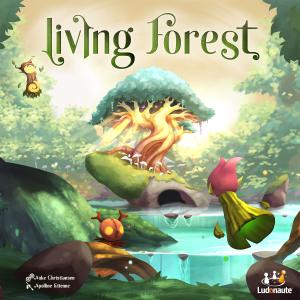
Living Forest has received wider distribution only quite recently, so hasn’t gathered too many ratings and is hence not strongly represented in the recommendations yet. But the jury has given almost unanimously high praises, so don’t make the mistake of overlooking this one.
The mixture of deck building and push-your-luck isn’t particularly new – it’s the same receipe behind Kennerspiel des Jahres 2018 winner The Quacks of Quedlinburg. But Living Forest still manages to create its very distinct spin on those ingredients and adds a pleasant dose of player interaction on top of that.
I’ve heard many experienced games being somewhat lukewarm on Living Forest after a game or two. I obviously don’t want to deny them their opinions, but I believe some of them aren’t quite open to the wonderful journey that the game takes you on as you explore the Living Forest deeper and deeper. During the first game, you might just be happy to draw some cards and build some trees. Then you discover the synergies and create a more efficient engine. Finally, you realise how ever decision you make affects the other players and become fiercely competitive.
I’ve played dozens of games on Board Game Arena and I’m still looking forward to many more!
Who will win?
Again, I think it’s pretty clear from the above that my money is on Living Forest to win Kennerspiel des Jahres 2022. It just hits the sweet spot of a fairly approachable game that offers enough challenges for those who are ready for a bit deeper experience. Cryptid and Dune: Imperium are clearly very strong games in their own right, but both the jury’s and my own enthusiasm quite clearly point towards Living Forest.
So it appears that for both awards I picked the nominee the community considers the least likely. We’ll know more on July 16. This award ceremony will actually mark the first time it’s being held on a Saturday evening and I have the immense honour to be in Berlin for the event. Needless to say, I’m very excited about this. Follow me on Twitter for some live coverage! 😎